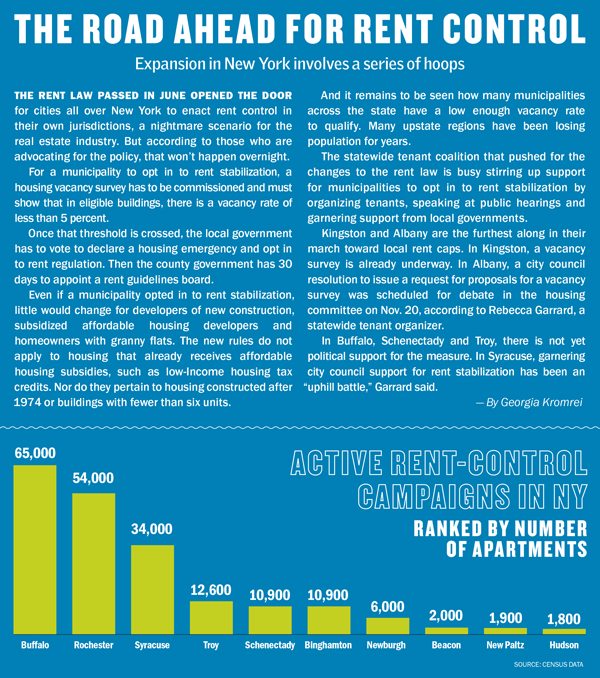On a weekly radio program in October, Jeff Hanley made an appeal to his suburban audience.
“The changes to the rent laws affect landlords and managers of thousands of rent-stabilized units in Westchester, Rockland and Nassau counties,” said Hanley, associate executive director of the Building & Realty Institute.
“We represent virtually every sector of the building, realty and construction sector on a 24/7 basis,” he added from his broadcast perch in Westchester, where the local trade group is based. “If you are involved in any of those sectors, we are definitely the membership organization for you and for your business.”
Like other New York real estate trade groups, BRI — which represents 300 landlords and managers of 17,000 rental units in Westchester County — is trying to grow its membership in the wake of the state’s new rent law. And it’s looking to do so, in part, by keeping outside partnerships to a minimum.
June’s rent law overhaul has lobbyists, lawyers and trade associations scrambling to service New York’s shell-shocked multifamily industry. With unprecedented hostility toward real estate interests taking hold in Albany and rent control poised to spread across the state, industry groups and government-relations firms are positioning themselves as the best bet for landlords with rent-stabilized properties outside of the city.
Since June, firms based upstate and on Long Island have spent more than $385,000 on lobbying around real estate issues in Albany. And while it’s unclear if political influencers can turn back the tide in the state, many are keeping busy as they peddle solutions for residential landlords and property managers.
“After the rent laws, it’s full employment for lobbyists,” said one Albany insider, who asked not to be named.
 Lisa DeRosa, a White Plains landlord and BRI member, said companies like hers were “dolphins swept up in the tuna net.” DeRosa, whose eponymous firm owns and manages 400 units locally, told The Real Deal that while it’s important to make the case to lawmakers directly, “landlords with six-unit [buildings] versus someone with a 6,000-unit portfolio” have different financial priorities.
Lisa DeRosa, a White Plains landlord and BRI member, said companies like hers were “dolphins swept up in the tuna net.” DeRosa, whose eponymous firm owns and manages 400 units locally, told The Real Deal that while it’s important to make the case to lawmakers directly, “landlords with six-unit [buildings] versus someone with a 6,000-unit portfolio” have different financial priorities.
“The BRI has successfully gotten us in front of many politicians in the legislative body,” she said. “I can’t speak for Manhattan, Long Island and upstate New York. But the people in Westchester seemed sincere.”
Ahead of the curve?
Kenneth Finger, the Building & Realty Institute’s general counsel and a principal at the White Plains law firm Finger & Finger, acknowledged that interest in the local trade group has gone up since the passage of the rent law. He called it a welcome side effect of its renewed outreach, though the organization’s lobbying expenditures have remained stable since June.
BRI, which was founded in 1946, represents one of five counties outside of New York City that were subject to rent stabilization before the new law created a path for localities statewide to limit rents.
It was one of the first groups to push back against the spread of rent regulation in 2016, when forces in Ossining pressured the Westchester County municipality to opt in to the Emergency Tenant Protection Act. BRI paid for direct-mail ads in 2016 warning Ossining homeowners that “taxes will likely increase if the Board of Trustees adopts ETPA” — a strategy to highlight tensions between homeowners and renters.
Initially, the $52,000 campaign worked: Mayor Victoria Gearity said at the time that she did not believe rent stabilization was right for Ossining.
But in September 2018, the village became the 20th municipality in Westchester to adopt rent regulation after its Board of Trustees voted in favor of the move. The expansion added roughly 1,000 apartments to the rent-stabilization system overnight.
With the state’s new law severely limiting rental application fees and increases to regulated rents, and potentially roping more localities into rent control, BRI and its members are taking a more aggressive approach to win back the narrative and make their case to suburban and upstate lawmakers. Westchester’s more than 133,000 rental units make up roughly 35 percent of the county’s housing market.
As the trade group steps up its lobbying, Finger said he’s preparing to sue New York state to challenge the statute.
“We are in the stages of drafting litigation, because in a sense, this legislation is about the taking of a landlord’s property without due process,” he noted. “We’re trying to meet with legislators and point out to them the various provisions of the law that are so burdensome.”
A tall order
The trade group faces some notable obstacles, including the permanence of the new law: Unlike in the past, the rent law will not expire every few years, which deprives opponents of leverage to change it.

Also, primary challenges from progressive candidates next year may pressure legislators to appeal to tenants. And while landlords’ opponents formed strategic statewide coalitions to notch their big win in Albany last session, the real estate industry is still trying to form a unified front.
BRI is hardly the first trade association looking to roll back the state’s rent law through legal action.
The New York Capital Region Apartment Association, an Albany-based lobbying group, recently tapped Boylan Code attorney Jamie Michelle Cain to find a chink in the armor by arguing that the changes to background checks and limits to application fees are onerous. The group has not yet filed litigation.
And New York City’s two main trade groups for multifamily landlords, the Rent Stabilization Association and the Community Housing Improvement Program, along with seven individual landlords, filed a federal lawsuit against the city and state in July. They allege that the new rent law violates the U.S. Constitution’s Fifth Amendment — which bars the taking of private property without “just compensation” — as well as the Fourteenth Amendment’s due process clause.
The 125-page complaint names the city, its Rent Guidelines Board and the state’s homes and community renewal commissioner, RuthAnne Visnauskas, as defendants. It seeks to prohibit the enforcement and application of the rent law, which took effect June 15.
But the legal process will take a while.
“For now, we’ve got to let things play out,” said RSA’s president, Joe Strasburg. “There are so many levers moving around, there are going to be other people litigating this. Between motions to dismiss and interveners, it’s going to take four years.”
Divided they stand
BRI, meanwhile, has taken more of a lone-wolf approach. The Westchester group had previously spurned entreaties from CHIP and has little interest in teaming up with the Real Estate Board of New York — an approach that struck some insiders as self-defeating.
“The fact that the groups want to get away from New York City politics, it’s not very smart,” Frank Sanzillo, Glenwood Management’s veteran lobbyist, told TRD. Their different priorities could allow them to have more of an impact on legislation going forward, he argued.
“The upstate and Long Island folks are not the New York City folks,” Sanzillo said. “I think the upstate landlords have an opportunity to get something done.”
In October, however, BRI joined the New York State Builders Association — a statewide umbrella organization that represents thousands of people in the real estate business — to lobby New York lawmakers to roll back the rent law.
That, in turn, forced the Westchester group’s hand, some say. Shortly after, five national real estate trade groups, including the one BRI just joined, pledged to support CHIP and RSA’s federal lawsuit challenging the rent law.
“The whole effort will collectively cost several million dollars,” said Jay Martin, CHIP’s executive director. “For that, we’ll need ongoing financial support from the industry collectively. That doesn’t come lightly.”
In a follow-up interview this month, Finger walked back his hostility toward CHIP and RSA, saying his group now coordinates with them to some degree. He noted that BRI contributed financially to CHIP and RSA’s ad push before the changes to the rent law were passed.
But BRI continues to keep its distance from other groups outside the city, including Albany’s Apartment Association, which gathered 400 of its members in a Utica casino this fall to devise a plan to take down the new rent law. While both industry groups have made efforts to educate their members on the newly minted regulatory system, they differ on the best lobbying approach.
Jon Woloshin, a real estate and finance analyst at UBS Global Wealth Management, said that given the slow pace of litigation, it makes more sense for New York’s trade groups to team up. “There are going to be a number of legal challenges — we can’t ignore the politics of this,” said Woloshin, who lives in Westchester.
He added that California’s industry groups “lobbied hard against” repealing the state’s Costa-Hawkins Rental Housing Act, and the rent laws that came out of that in October “generally were reasonable.”
“They struck a balance between tenant and landlord,” Woloshin said. “In New York, it would be prudent to present a united front.”
But finding common ground is easier said than done. Finger, for one, said BRI has little interest in working with organizations that have “different priorities” — and he derisively called REBNY “Stephen Ross and company,” referring to the CEO of the New York City-based giant Related Companies.
“What happens in their region is their problem,” he argued. “Our effort right now is a local effort.”

